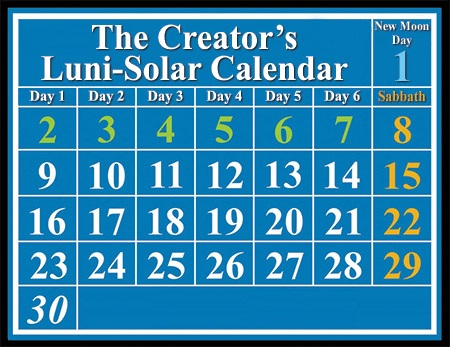Truth does not contradict itself. When all around is confusion and chaos, Truth alone stands unassailable.
 In the bewildering tumult of many opposing ideas, different claims against the Biblical lunar Sabbath have been made. Most of these are due simply to a lack of knowledge and understanding of the truth.
In the bewildering tumult of many opposing ideas, different claims against the Biblical lunar Sabbath have been made. Most of these are due simply to a lack of knowledge and understanding of the truth.
Everyone has inherited errors and traditions handed down from paganized Christianity. However, Scripture reveals its secrets to every Searcher for Truth. None need remain in confusion and error.
Following are 7 common objections raised against the Biblical Lunar Sabbath, and their respective Answers.
OBJECTION #1: "Lunar Sabbatarians don't count some days of the week. Their calendar is full of non-days!"
ANSWER: There is no such thing as a "non-day" or a "blank day." All time must be accounted for and the Biblical luni-solar calendar does not leave any time out. Solar and luni-solar calendars both use the movement of the sun to calculate the year. Because the solar year is 365.25 days long, the extra time is accounted for on the Gregorian calendar by adding in a leap day. This "leap" day is February 29 and occurs every four years.
On Solar calendars, the months are of arbitrary length and are not anchored to anything in nature. The Biblical luni-solar calendar, on the other hand, ties its months to the cycles of the moon. A lunation, like the solar year, is not a round number. A lunation contains 29.5 days. Because of this, some months have 29 days and other months have 30 days.
On a lunation of 30 days, the 30th day comes between the last seventh-day Sabbath of the month and the next month's New Moon day. It is not part of the weekly cycle but it is NOT a "blank" day. It has a date within the monthly cycle.
OBJECTION #2: "On the lunar calendar, the Sabbath floats around! Each month the weekly Sabbath occurs on different days of the week. Sometimes it is on Monday, then the next month it changes to Wednesday and after that to Thursday. It is never consistent."
 ANSWER: The most notable difference between the Gregorian calendar and that of the Biblical calendar is found in the weekly cycle. The Gregorian calendar, like the Julian calendar before it, has a continuous weekly cycle. The Biblical calendar, like all ancient calendars, does not.
ANSWER: The most notable difference between the Gregorian calendar and that of the Biblical calendar is found in the weekly cycle. The Gregorian calendar, like the Julian calendar before it, has a continuous weekly cycle. The Biblical calendar, like all ancient calendars, does not.
It is only the difference in weekly cycles that makes the lunar-based Sabbath appear to float from month to month on the Gregorian calendar.
The Biblical calendar is very constant. Because the weekly cycle of the Biblical calendar restarts with the New Moon, the dates of the month always fall on the same days of the week.
This is not so on the Gregorian solar calendar. The seventh-day Sabbath floats from date, to date, to date each month all through the year.
Far from floating around, the true Biblical Sabbath is very consistent and always falls on the 8th, 15th, 22nd and 29th days of the lunar month.
OBJECTION #3: "New Moons cannot be Sabbaths simply because the Bible gives numerous examples of people traveling or working on New Moons!"
ANSWER: It is true that the Bible gives examples of people traveling or constructing the tabernacle on New Moons. This is because New Moons are not seventh-day Sabbaths. The various prohibitions against travel and cooking on the seventh-day Sabbath were not applied to New Moon days.
However, New Moon days are worship days. They are a time of rejoicing and thanksgiving for the blessings of the past month and renewed consecration for the upcoming month. New Moons are in a class of worship day all by themselves.
This is demonstrated in the record of required sacrifices listed in Numbers 28 and 29. The days with the least amount of required sacrifices were common work days. The seventh-day Sabbath had more sacrifices required than ordinary work days. New Moon days had even more sacrifices required than for the seventh-day Sabbath. Only the annual feasts had more required daily sacrifices than New Moons.
Scripture presents New Moons as a time of worship in eternity future:
And it shall come to pass, that from one New Moon to another, and from one Sabbath to another, all flesh shall come to worship before Me, says Yahuwah. (See Isaiah 66:23.)
All who desire to worship the Creator will do so on His appointed times: the weekly, monthly and yearly times designated for worship.
OBJECTION #4: "This lunar Sabbath idea contradicts itself! If this theory were true, it means that the Exodus would have occurred on a lunar Sabbath, thus breaking the Sabbath."
ANSWER: It is true that the Israelites left Egypt on the 15th day of the First month. However they did not break the Sabbath, because the holy hours were already over by the time they left.
Scripture provides three important details about the Exodus.It occurred at night; It took place on the 15th of the month.
It suggests that there was a FULL MOON at that time – the MIDDLE of the month.
Deuteronomy 16:1 - "Observe the month of Abib, and keep the passover unto . . . [Yahuwah thy Elohim]; for in the month of Abib . . . [Yahuwah thy Elohim] brought thee forth out of Egypt by night. [See NOTE below.]
Numbers 33:3 - "And they departed from Rameses in the first month, on the fifteenth day of the first month; on the morrow after the passover the children of Israel went out with an high hand in the sight of all the Egyptians."
In addition to the date and time, here, special attention must also be given to the words “in the sight of all the Egyptians" as this suggests that there was a bright FULL MOON at that time – the MIDDLE of the month.
The date of the Exodus was the 15th of Abib, the first month, on the day after the Passover. Within a lunar month, the 15th is always a seventh-day Sabbath. However, the Israelites left at night, after the sacred hours of the Sabbath were past. They had been commanded not to leave their dwellings until the next morning after the Passover meal on the night of the 14th - Exodus 12:22 And ye shall take a bunch of hyssop, and dip it in the blood that is in the bason, and strike the lintel and the two side posts with the blood that is in the bason; and none of you shall go out at the door of his house until the MORNING [of the 15th]
NOTE: All of this makes it very clear that the dark hours of the night follows the daylight hours of the same day/date. AFTER the MORNING and DAYLIGHT hours of the 15th, they left Egypt BY NIGHT.
OBJECTION #5: "Saturday has always been the seventh-day Sabbath. In fact, the word 'Sabbath' has been preserved in many languages and it always designates the seventh-day Saturday."
ANSWER: The fact that the word "Sabbath" appears in many languages is not proof that Saturday is the Biblical Sabbath. All it proves is the wide-spread dissemination of paganized Christianity. "Saturday," like the continuous weekly cycle, is a fairly recent addition to the calendar.
When Julius Cæsar set aside the luni-solar calendar of the Roman Republic and adopted a straight solar calendar, the Julian calendar, the week had eight days, designated A through H.

Reconstruction of Fasti Antiates, the only calendar of the Roman Republic still in existence.
(Palazzo Massimo Alle Terme, ed. Adriano La Regina, 1998.)
As the Persian mystery cult of Mithraism gained popularity in Rome, the pagan planetary week was adopted. This was a seven-day week beginning on dies Saturni, or Saturn's day. The second day of the week was dies Solis, or Sun's Day. The third day of the week was dies Lunæ, or Moon's day. The week ended on dies Veneris, or Venus' Day which is the modern Friday.
Roman adoption of Mithraism is directly responsible for the abandonment of the eight-day Julian week, and the adoption of the seven-day planetary week:
It is not to be doubted that the diffusion of the Iranian [Persian] mysteries has had a considerable part in the general adoption, by the pagans, of the week with the Sunday as the holy day. The names which we employ, unawares, for the other six days, came into use at the same time that Mithraism won its followers in the provinces in the West, and one is not rash in establishing a relation of coincidence between its triumph and that concomitant phenomenon. (Robert L. Odom,Sunday in Roman Pagansim, p. 157.)
 |
| Roman Statue of Mithra |
The pre-eminence assigned to the dies Solis [day of the Sun] also certainly contributed to the general recognition of Sunday as a holiday. This is connected with a more important fact, namely, the adoption of the week by all the European nations. (Franz Cumont, Astrology and Religion Among the Greeks and Romans, p. 163.)
The seven day planetary week was named after the planetary gods. As this week spread throughout Europe, the names of the days of the week spread with it.
Many languages today show Roman Catholic influence by renaming the first day of week, Sunday, the "lord's day" and Saturday, the seventh-day of the week, "Sabbath." However, those are NOT the original names of the days of the week.
The astrological influence is obviously even more pronounced around the fringes of the Roman Empire, where Christianity arrived only much later. English, Dutch, Breton, Welsh, and Cornish, which are the only European languages to have preserved to this day the original planetary names of all the seven days of the week, are all spoken in areas that were free of any Christian influence during the first centuries of our era, when the astrological week was spreading throughout the Empire. (Eviatar Zerubavel, The Seven Day Circle: The History and Meaning of the Week, p. 24.)
Saturday, like the pagan Julian calendar that adopted it in the first centuries AD, is irreparably pagan. It is not the true Biblical seventh-day Sabbath and no amount of renaming it "the Sabbath" can transform it into being the true Bible Sabbath.
The pagan names of the planetary week have been perpetuated in the calendar in use among the so-called Christian nations. Every time we look at the calendar we have before us a constant reminder of the amalgamation of paganism and Christianity that took place as a result of the great religious apostasy - that "falling away" foretold by the apostle Paul, which occurred in the early centuries of the Christian church and made the modern Babel of conflicting sects and creeds which profess the name of Christ. (Robert L. Odom, Sunday in Roman Paganism, p. 202.)
OBJECTION #6: "The lunar cycle makes a person break the real unbroken seventh-day Sabbath that goes back to Creation week."
ANSWER: It is an assumption, based on long practice, that the week has cycled without interruption ever since Creation. However, the modern week comes directly from paganism. From the names of the days of the week, to the continuous weekly cycle, the pagan origins of the modern week can be traced. (The fallacy of the continuous weekly cycle is further demonstrated by the man-made International Date Line.)
The only resemblance to the Biblical week is found in the number of days within the week. Both the modern week and the Creation week have seven days. However, the modern week is a Satanic deception specifically designed to counterfeit the Biblical week.
The modern week, beginning on Sunday and ending on Saturday, was standardized at the Council of Nicæa in the fourth century A.D.:
 In 321 A.D., Constantine, emperor of Rome . . . by civil enactments made "the venerable day of the Sun," which day was then "notable for its veneration," the weekly rest day of the empire. . . . The enforcement of the weekly observance of Sunday gave official recognition to the week of seven days and resulted in the introduction of it into the official civil calendar of Rome. The Romans passed that calendar down to us, and in it we have still the ancient planetary titles of the days of the week. (Robert L. Odom, Sunday in Roman Paganism, pp. 244.)
In 321 A.D., Constantine, emperor of Rome . . . by civil enactments made "the venerable day of the Sun," which day was then "notable for its veneration," the weekly rest day of the empire. . . . The enforcement of the weekly observance of Sunday gave official recognition to the week of seven days and resulted in the introduction of it into the official civil calendar of Rome. The Romans passed that calendar down to us, and in it we have still the ancient planetary titles of the days of the week. (Robert L. Odom, Sunday in Roman Paganism, pp. 244.)
Counterfeit worship requires a counterfeit calendar and the Council of Nicæa provided it. Biblical calendation was supplanted by pagan solar calendation, and the planetary week replaced the Biblical week which depended upon the moon. (eLaine Vornholt & L. L. Vornholt-Jones, Calendar Fraud, p. 53.)
This planetary week was paganism's counterfeit of the true, Biblical week instituted by the Creator in the beginning of Earth's history. In the counterfeit week employed in ancient paganism "the venerable day of the Sun" was esteemed by the heathen above the other six days because it was regarded as sacred to the Sun, the chief of the planetary deities. . . . Just as the true Sabbath is inseparably linked with the Biblical week, so the false Sabbath [Saturday] of pagan origin needed a weekly cycle. Thus we have found that the planetary week of paganism is Sunday's twin sister, and that the two counterfeit institutions were linked together . . . . (Robert L. Odom, Sunday in Roman Paganism, pp. 243-244.)
OBJECTION #7: "The conflict between Sunday keeping and Sabbath keeping has always been against the day commonly known as 'Saturday.' There is no record of a conflict between Sunday and a floating Sabbath nor is there any record of Christians ever using a different calendar."
ANSWER: This is not true and the historical record proves it. The transition from worshipping by the Biblical calendar to full acceptance of the pagan calendar was not an event that occurred overnight or even within a single life-time. It was a process of creeping compromise centuries. As soon as some Christians began to apostatize, embracing various aspects of paganism, other Christians stood firm for the truth, unbending in the face of severe opposition.
At every step in the course of the apostasy, at every step taken in adopting the forms of sun worship, and against the adoption and the observance of Sunday itself, there had been constant protest by all real Christians. Those who remained faithful to Christ [the Saviour] and to the truth of the pure word of . . . [Yahuwah] observed the Sabbath of the Lord according to the commandment, and according to the word of . . . [Elohim] which sets forth the Sabbath as the sign by which the Lord, the Creator of the heavens and the earth, is distinguished from all other gods. These accordingly protested against every phase and form of sun worship. Others compromised, especially in the East, by observing both Sabbath and Sunday. But in the west under Roman influences and under the leadership of the church and the bishopric of Rome, Sunday alone was adopted and observed. (A. T. Jones, The Two Republics, pp. 320-321.)
This creeping compromise by Christians with some worshipping on both the lunar Sabbath and Sunday, others on Saturday and Sunday, and some on Sunday alone, caused great confusion among the pagan Mithraists.
Tertullian, an early Christian writer, admitted this fact. He clearly stated that Christians who worshipped on Saturn's day as the seventh day of the week were themselves deviating from an Israelite custom of which they were ignorant.
We shall be taken for Persians [Mithraists], perhaps . . . The reason for this, I suppose, is that it is known that we pray towards the east . . . Likewise, if we devote the day of the Sun to festivity (from a far different reason from Sun worship), we are in a second place from those who devote the day of Saturn, themselves also deviating by way of a Jewish custom of which they are ignorant. (Tertullian, Apologia.)
 |
| A stick calendar found at the Baths of Titus depicting Saturday (or dies Saturni – the day of Saturn) as the first day of the pagan planetary week (constructed 79 – 81 A.D.) Click here for more info on the history of the modern calendar. |
Additional evidence of Christians using both the Biblical calendar and the pagan Julian calendar can be found in various early inscriptions on sepulchers. One of the oldest sepulchral inscriptions dates from A.D. 269. It states:
In the consulship of Claudius and Paternus, on the Nones of November, on the day of Venus, and on the 24th day of the lunar month, Leuces placed [this memorial] to her very dear daughter Severa, and to Thy Holy Spirit. She died [at the age] of 55 years, and 11 months [and] 10 days. (E. Diehl, Inscriptiones Latinæ Christianæ Verteres, p. 193.)
This is amazing confirmation of Christian use of lunar months. The "Nones" of November is November 5 which, that year, fell on the day of Venus, or Friday. However, the 24th day of the lunar month falls on the second day of the week!
The facts of history reveal Saturday to be nothing more than a day on the pagan planetary week, honoring the blood-thirsty planetary god: Saturn.
The wide-spread acceptance of tradition has led many to assume that their beliefs are based solely on Scripture when, in fact, many beliefs are merely ancient customs handed down from pagans.
All have a solemn responsibility to study each belief for themselves. Let no one take a stand against the truth of the Biblical calendar until a thorough study of the subject has been made. Scripture warns against anyone taking a hasty and dogmatic stance prior to searching for truth:
"He who answers a matter before he hears it, It is folly and shame to him." (Proverbs 18:13, NKJV)
The Sabbath, which is the sign of loyalty to the Creator, is of paramount importance to everyone living on earth. Therefore:
"Study to show thyself approved unto Elohim, a workman that needeth not to be ashamed, rightly dividing the word of truth." (See 2 Timothy 2:15.)
Will you accept Heaven's challenge to study for yourself?
Will you search to find and observe the true seventh-day Sabbath?







